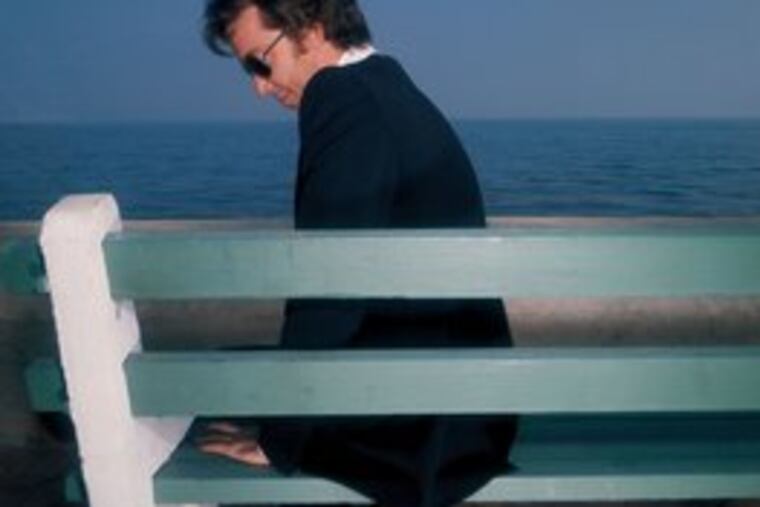A new blue-eyed soul man in town
Blue-eyed soul. The Righteous Brothers made it. So did Roy Head - father of ousted American Idol wannabe Sundance. Seventies rockers Boz Scaggs and Robert Palmer were acolytes.

Blue-eyed soul.
The Righteous Brothers made it.
So did Roy Head - father of ousted American Idol wannabe Sundance.
Seventies rockers Boz Scaggs and Robert Palmer were acolytes.
Eighties New Wavers Simply Red and Culture Club wore it like a second skin.
Philly's Todd Rundgren and Hall & Oates were past masters (although both objected to the label).
Glam avatars David Bowie and Elton John tried it on - in Philly, yet.
Ladies from Dusty Springfield to Teena Marie to Christina Aguilera have been linked with it.
George Michael embraced it after Wham!; Michael McDonald after the Doobie Brothers; and Justin Timberlake after 'N Sync.
Now blue-eyed soul has an exciting - and surprising - new standard-bearer in Robin Thicke, who is making a splash with his funky, chic album The Evolution of Robin Thicke. (The singer's show at the Electric Factory on Tuesday is sold out.)
Thicke is leading a soul charge that includes Amy Winehouse (Back to Black), Joss Stone (Introducing), and Simply Red (Stay), along with the remastered rerelease of two genre classics, Boz Scaggs' smooth Silk Degrees and David Bowie's suave Young Americans (due in May).
Still, Thicke may be the most purely soulful of the bunch, judging by his across-the-boards showing on the R&B charts. His slow-jamming "Lost Without U," for instance, topped Billboard's Urban Adult Contemporary charts. You'd have to go back to Jon B. in the '90s to find a similar example of reverse crossover success.
"The urban music market is so saturated with hip-hop that audiences are looking for something with substance," says Bob Burke, managing director of the music industry magazine Friday Morning Quarterback. "This guy has substance."
Philly DJs agree. So far this month, "Lost Without U" has averaged 75 spins a week on Power 99 FM (WUSL-FM, 98.9), as well as ample play on WDAS-FM (105.3) and Q102 FM (WIOQ, 102.1).
Thicke has an unlikely pedigree for a soul man. The 30-year-old is the son of soap star Gloria Loring and television personality Alan Thicke. But he's a recording studio veteran, having written and/or produced for Aguilera, Usher, and - at age 16 - for Brandy.
Thicke's sultry baritone with its falsetto breaks and his warm catchy melodies make Evolution swing. You can say the same thing for Winehouse's cocky Back to Black and Stone's confident Introducing.
And Stay, from Mick Hucknell's Simply Red, is notable for its honey-coated vocals and Sound of Philadelphia-inspired orchestration. "I've always loved the Philly strings," says Hucknell. "They always sounded so damned expensive."
The phrase "blue-eyed soul" refers to white singers who take on black stylings. But it is often misapplied. Taylor Hicks may be fly for a white guy - gruff and raw. But Hicks' grit lacks the panache of blue-eyed soul's best. That requires the ability to emote with the depth, dynamics and power - and silken subtlety - of the very finest black singers.
"There's something ambiguous about it," Hucknell says of the "blue-eyed" tag. "It's racist. Sad to imagine that black America just think they did it all by themselves or the other way around. Black music has influenced everything."
The most famous local purveyors of the genre, Hall & Oates, have always eschewed the label. "John's eyes are brown" is Hall's stock rebuttal. But the duo is well aware that it was urban radio that first embraced its creamy singles "She's Gone" in 1974 and "Sara Smile" in 1975.
Philadelphia has played an important role in the development of blue-eyed soul. In fact, Georgie Woods, the late WDAS on-air jock, is credited with coining the phrase (as a way of describing the Righteous Brothers).
According to local radio legend Jerry Blavat, Woods had a more visceral reaction to Pennsylvania's the Magnificent Men. Of the Men's steamy 1965 hit "Peace of Mind," Blavat says, "When you heard the record, you thought you were listening to the Temptations."
Blavat remembers that after spinning the song on his WHAT-AM radio show, he got a call from Woods. His colleague wanted to book the act, sight unseen, at Philly's legendary soul theater, the Uptown.
All went well until Woods met the band backstage. " 'But they're white,' " says Blavat, paraphrasing Woods. " 'We never had a white act at the Uptown.' "
"I told Georgie, 'What's music have to do with color?' " says Blavat. "If it's good, it's good. Timberlake and Thicke, whether they know it or not, are products of what the Magnificent Men and the Righteous Brothers were: White kids with soul."